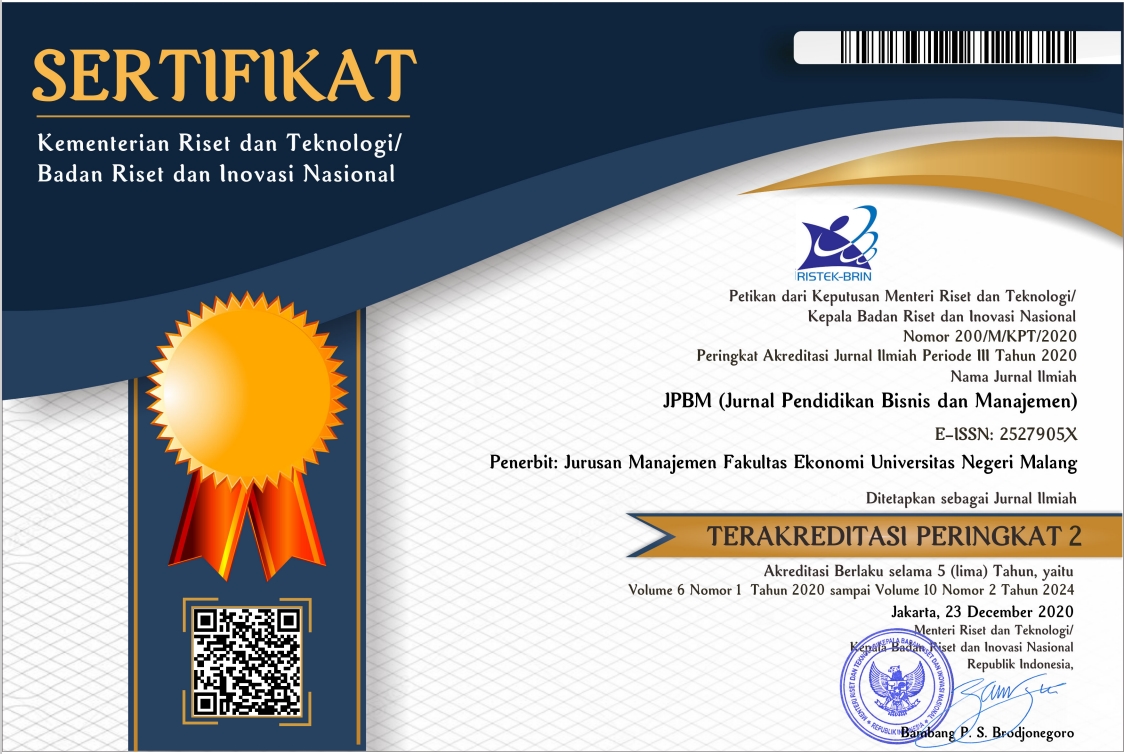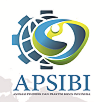The Determinant of Green Entrepreneurial Knowledge on SMEs in Indonesia
Abstract
This study aims at analyzing factors that influence green entrepreneurial knowledge on SMEs in West Java. The variables reviewed in this study were the role of entrepreneurship education, media, public figure, and government on green entrepreneurial knowledge. It used explanatory survey to collect data. The population in this study were 4.285 SMEs engaged in the culinary industry in Bandung. The sample retrieval technique employed was the Slovin formula which resulted on 240 respondents. Furthermore, the collected data was analyzed using Multiple Regression Analysis. The results show that the influential factors in increasing green entrepreneurial knowledge are entrepreneurship education, media, public figures, and government both partially and simultaneously. These findings implied that it is essential to improve green entrepreneurial knowledge; it takes the role of media, public figures, entrepreneurship education, and government.
Keywords: green entrepreneurial knowledge, media, government, SMEs
Keywords
Full Text:
PDFReferences
Adha, R. (2015). Peran komunikasi interpersonal lurah dalam meningkatkan partisipasi masyarakat pendatang pada program hijau bersih sehat (Hbs) di Kelurahaan Sidomulyo Kecamatan Samarinda Ilir Kota Samarinda. E-Journal Ilkom Fisip, 3(1), 398–415.
Badan Pusat Statistik. (2018). Data statistik dan hasil survey ekonomi kreatif (Vol. 7, Issue 9).
Berrone, P., Fosfuri, A., Gelabert, L., & Gomez-Mejia, L. R. (2013). Necessity as the mother of “green” inventions: Institutional pressures and environmental innovations. Strategic Management Journal, 34(8), 891–909. https://doi.org/10.1002/smj.2041
Bismala, L. (2014). Analisis Strategi pemasaran pada UMKM di sumatera utara untuk meningkatkan daya saing UMKM. Jurnal Pembangunan Perkotaan.
Damerell, P., Howe, C., & Milner-Gulland, E. J. (2013). Child-orientated environmental education influences adult knowledge and household behaviour. Environmental Research Letters, 8(1), 015016 https://doi.org/10.1088/1748-9326/8/1/015016
Davari, A., Iyer, P., & Strutton, D. (2017). Investigating moral links between religiosity, altruism, and green consumption. Journal of Nonprofit and Public Sector Marketing, 29(4), 385–414. https://doi.org/10.1080/10495142.2017.1326338
Doh, S., & Kim, B. (2014). Government support for SME innovations in the regional industries: The case of government financial support program in South Korea. Research Policy, 43(9), 1557–1569. https://doi.org/10.1016/j.respol.2014.05.001
Febriana, S., & Diartho, H. I. (2019). Hubungan pembangunan ekonomi terhadap kualitas lingkungan hidup di provinsi Jawa Timur. Jurnal Dinamika Ekonomi Pembangunan, 2(2), 1-13.
Fryxell, G. E., & Lo, C. W. H. (2003). The influence of environmental knowledge and values on managerial behaviours on behalf of the environment : An empirical examination of managers in China. Journal of Business Ethics, 45–69.
Gamede, B. T., & Uleanya, C. (2017). The role of entrepreneurship education in secondary schools at further education and training phase. Academy of Entrepreneurship Journal, 23(2), 1–12.
Giudici, G., Guerini, M., & Rossi-Lamastra, C. (2019). The creation of cleantech startups at the local level: the role of knowledge availability and environmental awareness. Small Business Economics, 52(4), 815–830. https://doi.org/10.1007/s11187-017-9936-9
Gluch, P., & Stenberg, A. C. (2006). How do trade media influence green building practice? Building Research and Information, 34(2), 104–117. https://doi.org/10.1080/09613210500491613
Greene, P. G., Brush, C. G., Eisenman, E. J., Neck, H., & Perkins, S. (2015). Entrepreneurship education: a global consideration from practice to policy around the world with contributions from: the finnish lifelong learning foundation. 112. www.XueTangX.com
Holbert, R. L., Kwak, N., & Shah, D. V. (2003). Environmental concern, patterns of television viewing, and pro-environmental behaviors: integrating models of media consumption and effects. Journal of Broadcasting & Electronic Media, 47(2), 177–196. https://doi.org/10.1207/s15506878jobem4702_2
Jamison, A. (2003). The making of green knowledge: The contribution from activism. Futures, 35(7), 703–716. https://doi.org/10.1016/S0016-3287(03)00023-5
Kusnadi, E., & Iskandar, D. (2017). Peranan tokoh masyarakat dalam membangun partisipasi kewargaan pemuda karang taruna. Prosiding Konferensi Nasional Kewarganegaraan III, November, 358–363.
Laroche, M., & Bergeron, J. (2016). Targeting consumers who are willing to pay more for environmentally friendly products journal of consumer marketing article information : July. https://doi.org/10.1108/EUM0000000006155
Lee, S. M., Chang, D., & Lim, S. (2005). Impact of entrepreneurship education: a comparative study of the U.S. and Korea. The International Entrepreneurship and Management Journal, 1(1), 27–43. https://doi.org/10.1007/s11365-005-6674-2
Leman, F. M., & Soelityowati, J. P. (2020). Dampak Fast fashion terhadap lingkungan. Seminar nasional envisi 2020 : Industri kreatif. http://www.fastfashion-dieausstellung.de/de/
Loiseau, E., Saikku, L., Antikainen, R., Droste, N., Hansjürgens, B., Pitkänen, K., Leskinen, P., Kuikman, P., & Thomsen, M. (2016). Green economy and related concepts: An overview. Journal of Cleaner Production, 139, 361–371. https://doi.org/10.1016/j.jclepro.2016.08.024
Lotfi, M., Yousefi, A., & Jafari, S. (2018). The effect of emerging green market on green entrepreneurship and sustainable development in knowledge-based companies. Sustainability, 10(7). https://doi.org/10.3390/su10072308
Michael, S. C., & Pearce, J. A. (2009). The need for innovation as a rationale for government involvement in entrepreneurship. Entrepreneurship and Regional Development, 21(3), 285–302. https://doi.org/10.1080/08985620802279999
Muler, Y. & R. (2020). Pemanfaatan limbah plastik menjadi produksi industri kreatif. Jurnal Abdimas Mandiri, 4(1), 1–10.
Pambudi, T. S. (2016). Peran media dalam menginformasikan wacana green design kepada masyarakat. Idealog: Ide dan Dialog Desain Indonesia, 1(1), 37-46.
Potter, J., & Halliday, Q. (1990). Community leaders. A device for warranting versions of crowd events. Journal of Pragmatics, 14(6), 905–921. https://doi.org/10.1016/0378-2166(90)90046-G
Qader, I. K. & Y. Z. (2011). Investigating the influence of safety and health concerns and self-efficacy on lecturer’s environmental attitudes towards electronic green products. Interdisciplinary Journal of Contemporary Research in Business, 3(2), 366–381.
Rajagukguk, W. (2015). Hubungan degradasi lingkungan dan pertumbuhan ekonomi : kasus Indonesia. Proceeding of the Dinamika Dan Peran Ilmu Manajemen Untuk Menghadappi AEC, November 2015. https://doi.org/10.13140/RG.2.2.17987.91680
Santoalha, A., & Boschma, R. (2020). Diversifying in green technologies in European regions : does political support matter ? Diversifying in green technologies in European regions : does political support matter ? Regional Studies, 0(0), 1–14. https://doi.org/10.1080/00343404.2020.1744122
Silajdžić, I., Kurtagić, S. M., & Vučijak, B. (2015). Green entrepreneurship in transition economies: A case study of Bosnia and Herzegovina. Journal of Cleaner Production, 88, 376–384. https://doi.org/10.1016/j.jclepro.2014.07.004
Siswanto, B., Adrie, D., & Wacana, K. K. (2012). Pendekatan Kelembagaan dalam pengembangan model perekonomian hijau. Ilmiah Manajemen Bisnis, 99–106.
Sriyono. (2014). Implementation of Green Economy on The Development of SMEs in Sidoarjo District. The Third International Conference 0n Entrepreneurship and Business Management (ICEBM), November 2014.
Sudayanto., Ragimun., & Rahma, R. (2011). Starategi pemberdayaan UMKM menghadapi pasar bebas ASEAN. Universitas Negeri Jember, 1(UMKM menghadapi pasar bebas ASEAN), 1. http://jurnal.unpad.ac.id/sosiohumaniora/article/view/12249/6227
Sunny, S. A., & Shu, C. (2019). Investments, incentives, and innovation: geographical clustering dynamics as drivers of sustainable entrepreneurship. Small Business Economics, 52(4), 905–927. https://doi.org/10.1007/s11187-017-9941-z
Suyatna, H., Santosa, A., Nayono, I. S., & Wibowo, I. A. (2018). Model inkubator kewirausahaan hijau: Studi kasus di desa Nglanggeran, Kabupaten Gunungkidul DIY. January.
Tan, B. C. (2011). The roles of knowledge, threat, and PCE on green purchase behaviour. International Journal of Business and Management, 6(12), 14-27. https://doi.org/10.5539/ijbm.v6n12p14
Tedjasuksmana, B. (2014). Potret Umkm Indonesia menghadapi masyarakat ekonomi Asean 2015. The 7th NCFB and Doctoral Colloquium 2014 Towards a New Indonesia Business Architecture Business And Economic Transformation Towards AEC 2015, 189–202.
Torabi, M., & Noori, S. M. (2019). Religious leaders and the environmental crisis using knowledge and social influence to counteract climate change. Ecumenical Review, 71(3), 344–355. https://doi.org/10.1111/erev.12434
Trivedi, R. H., Patel, J. D., & Acharya, N. (2018). Causality analysis of media influence on environmental attitude, intention and behaviors leading to green purchasing. Journal of Cleaner Production, 196, 11–22. https://doi.org/10.1016/j.jclepro.2018.06.024
UNEP. (2011). Pathways to sustainable development and poverty eradication - A Synthesis for Policy Makers. Towards a GREEN Economy, 52.
Utami, B. N., & Khonitan, D. (2018). Peran tokoh masyarakat dalam menumbuhkan jiwa social enterprenerurship masyarakat berbasis pertanian di Desa Bukit Langkap Kabupaten Lingga. Seminar Nasional Politeknik Pembangunan Pertanian Malang, 1.
Weerawardena, J., & Sullivan Mort, G. (2006). Investigating social entrepreneurship: A multidimensional model. Journal of World Business, 41(1), 21–35. https://doi.org/10.1016/j.jwb.2005.09.001
Yi, G. (2020). From green entrepreneurial intentions to green entrepreneurial behaviors: the role of university entrepreneurial support and external institutional support. International Entrepreneurship and Management Journal, 2. https://doi.org/10.1007/s11365-020-00649-y
York, J. G., & Venkataraman, S. (2010). The entrepreneur-environment nexus: Uncertainty, innovation, and allocation. Journal of Business Venturing, 25(5), 449–463. https://doi.org/10.1016/j.jbusvent.2009.07.007
Yu, T. Y., Yu, T. K., & Chao, C. M. (2017). Understanding Taiwanese undergraduate students’ pro-environmental behavioral intention towards green products in the fight against climate change. Journal of Cleaner Production, 161, 390–402. https://doi.org/10.1016/j.jclepro.2017.05.115
Zulfikar, R. & P. A. M. (2019). The Level of environment knowledge , perception , and behavior of South Kalimantan MSME in implementing the green economy. Prosiding Seminar Nasional Lingkungan Lahan Basah, 4(April), 459–464.
DOI: http://dx.doi.org/10.17977/um003v6i22020p099
Refbacks
- There are currently no refbacks.
JPBM (Jurnal Pendidikan dan Bisnis Manajemen) is licensed under a Creative Commons Attribution-NonCommercial-ShareAlike 4.0 International License.
JPBM (Jurnal Pendidikan dan Bisnis Manajemen) is abstracted and indexed in :
















